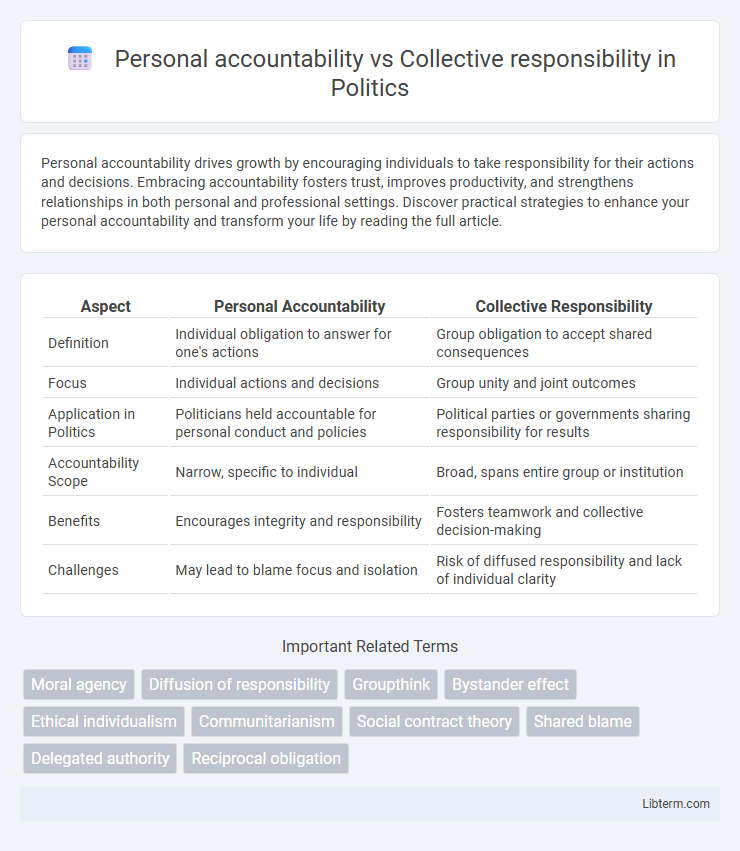Personal accountability drives growth by encouraging individuals to take responsibility for their actions and decisions. Embracing accountability fosters trust, improves productivity, and strengthens relationships in both personal and professional settings. Discover practical strategies to enhance your personal accountability and transform your life by reading the full article.
Table of Comparison
| Aspect | Personal Accountability | Collective Responsibility |
|---|---|---|
| Definition | Individual obligation to answer for one's actions | Group obligation to accept shared consequences |
| Focus | Individual actions and decisions | Group unity and joint outcomes |
| Application in Politics | Politicians held accountable for personal conduct and policies | Political parties or governments sharing responsibility for results |
| Accountability Scope | Narrow, specific to individual | Broad, spans entire group or institution |
| Benefits | Encourages integrity and responsibility | Fosters teamwork and collective decision-making |
| Challenges | May lead to blame focus and isolation | Risk of diffused responsibility and lack of individual clarity |
Understanding Personal Accountability
Understanding personal accountability involves recognizing individual ownership of actions, decisions, and their consequences within any given context. It drives self-discipline, ethical behavior, and proactive problem-solving by fostering a sense of duty and integrity. Developing personal accountability enhances trust and reliability, serving as the foundation for effective teamwork and collective responsibility.
Defining Collective Responsibility
Collective responsibility refers to a group's shared obligation to achieve common goals and uphold ethical standards, often seen in organizations, governments, and communities. It emphasizes mutual accountability, where each member's actions impact the entire group, fostering collaboration and unity. This concept plays a crucial role in teamwork dynamics and institutional governance, promoting transparency and collective decision-making.
Key Differences Between Accountability and Responsibility
Personal accountability emphasizes an individual's obligation to answer for their actions and outcomes, ensuring direct ownership of tasks and decisions. Collective responsibility involves a group sharing the duty to achieve common goals and address any consequences, spreading accountability among team members. Key differences include the scope of ownership--individual versus group--and the nature of answerability, where accountability demands explicit reporting, while responsibility pertains to the broader commitment to duties.
Historical Perspectives on Responsibility
Historical perspectives on responsibility reveal a shift from primarily collective accountability in tribal and feudal societies to an increased emphasis on personal accountability during the Enlightenment and modern eras. Ancient cultures often linked individual actions to communal consequences, embedding responsibility within social and familial structures, whereas contemporary legal and ethical frameworks tend to prioritize the autonomy of individual agents. This evolution reflects broader changes in governance, social organization, and philosophical understandings of moral agency and justice.
Benefits of Embracing Personal Accountability
Embracing personal accountability cultivates a stronger work ethic and enhances individual performance, leading to increased trust and reliability within teams. It empowers individuals to take ownership of their decisions and actions, fostering growth and continuous improvement. This mindset also reduces blame-shifting, streamlines problem-solving, and strengthens overall organizational effectiveness.
The Power of Collective Responsibility in Communities
Collective responsibility in communities drives shared commitment to common goals, fostering cooperation and social cohesion. This collective power amplifies problem-solving capacity, enabling groups to address challenges more effectively than isolated individual efforts. Strong community bonds created through collective responsibility promote resilience, mutual support, and sustainable development.
Challenges in Balancing Individual and Group Duties
Balancing personal accountability with collective responsibility often creates challenges in distinguishing individual contributions from group efforts, leading to disputes over credit and blame. Conflicts arise when individual goals clash with collective objectives, hindering collaboration and reducing overall productivity. Effective management requires clear communication, defined roles, and a shared understanding of accountability mechanisms to harmonize personal and group duties.
Personal Accountability in the Workplace
Personal accountability in the workplace drives employees to take ownership of their tasks, resulting in increased productivity and trust within teams. When individuals consistently meet deadlines and accept responsibility for their actions, organizational goals are more effectively achieved. This proactive mindset fosters a culture of reliability, transparency, and continuous improvement.
Collective Responsibility in Social Movements
Collective responsibility in social movements emphasizes the shared commitment and accountability of all members toward achieving common goals, reinforcing unity and coordinated action. Movement success often depends on distributed roles where individuals contribute to strategic planning, mobilization, and advocacy, ensuring sustained pressure for social change. This collective approach fosters resilience and amplifies voices, enhancing impact and legitimacy in addressing systemic injustices.
Fostering a Culture of Accountability and Responsibility
Fostering a culture of accountability and responsibility requires balancing personal accountability with collective responsibility to ensure team cohesion and individual growth. Clear communication of expectations and regular feedback loops reinforce ownership of tasks while promoting mutual support in achieving organizational goals. Empowering employees to take initiative alongside shared accountability mechanisms drives consistent performance and ethical decision-making.
Personal accountability Infographic

 libterm.com
libterm.com